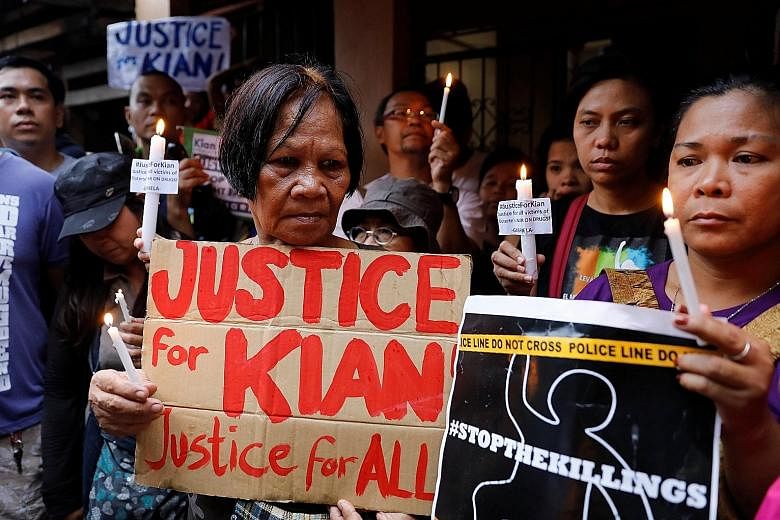The killing of a 17-year-old high school student was just one death too many.
On Aug 16, anti-narcotics agents raided a rundown district in Caloocan city, north of Manila. Three of them ran into Kian Loyd delos Santos. Moments later, the boy was found dead in a dark alleyway.
The 12th-grade student would be among 18 people killed that night. By then, the police had killed at least 85 in three nights of bloody crackdowns on suspected drug dealers and addicts.
But it was Kian's death that has roused a nation from its apathy-induced stupor. It has united the public, politicians from all sides and the Catholic Church into taking a tougher stand against President Rodrigo Duterte's war on drugs.
Adding fuel to the fiery backlash and sparking calls for an impartial investigation into the surge of killings by the police overall are new details on the student's killing.
The policemen who killed Kian said they fired back when he shot at them and tried to flee. They had him marked as a drug courier for his father and uncles.
But footage from a security camera showed that two agents already had the boy in custody and were dragging him to where his body was later found. A witness said he heard the boy pleading as he was being beaten: "Enough, please! Enough! I have a test tomorrow."
The boy was then forced to take a gun, fire it and told to run away. He ran, but was not quick enough.
An autopsy later revealed he was shot three times, once in the back and twice in the head, as he was already lying face down on the pavement.
In response to the growing backlash, Mr Duterte said yesterday he could not justify the boy's killing. He said that the police officers responsible had not followed instructions and would face justice.
Still, he faces the most intense scrutiny so far in his controversial but popular crackdown. Since he took office in June last year, the police say 3,200 suspects have been killed during drug raids.
But human rights activists insist the number is closer to 13,000, enough to fill the Singapore Indoor Stadium. Two-thirds are believed to have been killed by paid assassins backed by the police.
Catholic leaders are calling attention to the deaths by ringing church bells across the Philippines. The bells will peal again and again for three months to rouse a citizenry "which has become a coward in expressing anger against evil", said Archbishop Socrates Villegas, who heads an influential bloc of bishops.
"The country is in chaos. The officer who kills is rewarded and the slain get the blame," he said.
The surge of outrage against Mr Duterte's strong-arm policies is bringing a nation of more than 100 million to a stand-off. How it will play out, though, is anyone's guess.
Mr Duterte is promising to send the policemen who killed Kian to jail if they are found guilty. That is a departure from the blanket absolution he has given to police officers behind the killing of two mayors in his list of "narco-politicians".
Yesterday, he said his order was "to destroy (the drug apparatus)", but that he has repeatedly reminded the police "not to kill a person who is kneeling down and begging for his life. That is murder".
That pivot is already deflecting criticism, according to Mr Rigoberto Tiglao, a pro-Duterte columnist and a former diplomat. He said with Mr Duterte's anti-crime drive still enjoying the support of two-thirds of the population, the fallout from Kian's killing "won't be a political storm for Duterte".
But it is not just Kian's killing that is fuelling the rage. An ongoing congressional investigation into the smuggling of 6.4 billion pesos (S$170 million) worth of methamphetamine from China has embroiled Mr Duterte's son, Paolo, vice-mayor of Davao City. Parallels have been drawn: If you are poor, you can be killed in a dark alley. If you are wealthy and have political influence, you enjoy due process.
Mr John Nery, a Philippine Daily Inquirer columnist, sees the scale tipping to Mr Duterte's opponents: "I do not think the momentum of outrage over Kian's killing… is enough to bring the country to the third stage. (But) we can hope that (it) has moved enough of the (Senate majority) - or two or three more justices, or the professionals in the military, or more leaders of the church - to say, 'Enough'."

